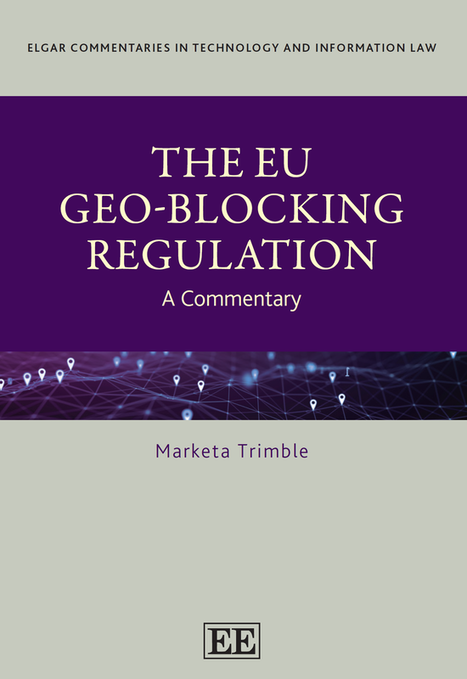|
On this website, Marketa Trimble provides links and other cites to her articles and to sources on legal aspects of geolocation, geoblocking, the evasion of geolocation, and the circumvention of geoblocking. Marketa Trimble's book on geoblocking was published by Edward Elgar. For the links and other cites by categories, visit the Sources on Geoblocking page. |
Here are some key definitions:
Geolocation
Geolocation means "the physical location of an internet-connected device. The location of the device may correspond to the location of the user who is using the device... [G]eolocation does not necessarily reveal the identity of the user of the device because internet-connected devices may be accessible to and used by multiple users."
Marketa Trimble, Geoblocking and “Legitimate Trade,”
in Intellectual Property and Obstacles to Legitimate Trade (Christopher Heath, Anselm Kamperman Sanders & Anke Moerland eds., 2018)
Geoblocking
"Geoblocking (sometimes called 'geo-fencing') goes a step further than geolocation. ... Once a device is geolocated, geoblocking can be used to block access to content based on the determined location of the device. Geolocation, when implemented without geoblocking, permits a user to opt out of geographically targeted delivery and view content that is not localized at all, or is localized for a different location. ... Geoblocking, on the other hand, aims to prevent the user from accessing blocked content."
Marketa Trimble, Geoblocking and “Legitimate Trade,”
in Intellectual Property and Obstacles to Legitimate Trade (Christopher Heath, Anselm Kamperman Sanders & Anke Moerland eds. 2018)
Evasion of Geolocation
An internet user evades (or circumvents) geolocation when the user bypasses geolocation tools and either does not disclose his physical location at all, or pretends as if he were located in a place other than his physical location.
Circumvention of Geoblocking
An internet user circumvents geoblocking when the user bypasses or disables geoblocking tools and accesses content that is not intended to be available in the physical location of the user.
Geolocation
Geolocation means "the physical location of an internet-connected device. The location of the device may correspond to the location of the user who is using the device... [G]eolocation does not necessarily reveal the identity of the user of the device because internet-connected devices may be accessible to and used by multiple users."
Marketa Trimble, Geoblocking and “Legitimate Trade,”
in Intellectual Property and Obstacles to Legitimate Trade (Christopher Heath, Anselm Kamperman Sanders & Anke Moerland eds., 2018)
Geoblocking
"Geoblocking (sometimes called 'geo-fencing') goes a step further than geolocation. ... Once a device is geolocated, geoblocking can be used to block access to content based on the determined location of the device. Geolocation, when implemented without geoblocking, permits a user to opt out of geographically targeted delivery and view content that is not localized at all, or is localized for a different location. ... Geoblocking, on the other hand, aims to prevent the user from accessing blocked content."
Marketa Trimble, Geoblocking and “Legitimate Trade,”
in Intellectual Property and Obstacles to Legitimate Trade (Christopher Heath, Anselm Kamperman Sanders & Anke Moerland eds. 2018)
Evasion of Geolocation
An internet user evades (or circumvents) geolocation when the user bypasses geolocation tools and either does not disclose his physical location at all, or pretends as if he were located in a place other than his physical location.
Circumvention of Geoblocking
An internet user circumvents geoblocking when the user bypasses or disables geoblocking tools and accesses content that is not intended to be available in the physical location of the user.
Website and text © 2024 Marketa Trimble
Banner image © 2023 Kanawat Thongrod
Book cover © 2024 Edward Elgar Publishing Ltd.
Banner image © 2023 Kanawat Thongrod
Book cover © 2024 Edward Elgar Publishing Ltd.
